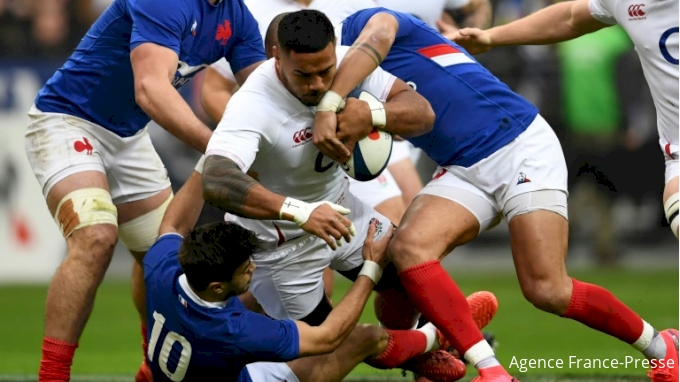Rees' Pieces Vol. 1: Why Does The Southern Hemisphere Dominate Rugby?
Rees' Pieces Vol. 1: Why Does The Southern Hemisphere Dominate Rugby?
Volume 1 of Rees' Pieces weekly column dives into the question of why the Southern Hemisphere has always dominated the sport of rugby.

My name is Alex Rees and today I am introducing a new FloRugby column titled "Rees' Pieces". I currently play rugby in Austin, Texas for the Austin Huns and the Austin Gilgronis, as well as write and create content for FloSports.
The aim of this column is to explore questions and topics surrounding the game of rugby, which I and many others hold closely to our hearts. So here you are, the first edition of Rees' Pieces. In Volume 1 I am going to explore a question that, disappointing as it may be to half the world, stands out like a sore thumb in rugby:
"Why has the Southern Hemisphere always dominated rugby?"
This question may rub some of us northerners the wrong way -- particularly the England fans -- but it's a painful truth. Since the World Cup was first conceived in 1987, eight of the nine winners have been from south of the equator -- no, England fans, I have not forgotten Jonny's kick for the ages. That is some serious dominance, and it isn't just a World Cup era thing either.
Since international rugby gained steam around the turn of the 20th century, the big three teams from the South -- New Zealand, South Africa, Australia -- have had a strong grip on the reins of trans-national competition. Both the All Blacks and the Springboks have winning records against every single Northern Hemisphere team, while the Wallabies have winning records against every northern team except for England, with whom they are tied all time at 25 wins apiece.

Even the mighty British & Irish Lions have struggled. Although they own a 17-6 record against Australia all time, they are 7-30-4 against New Zealand and 17-23-6 against South Africa.
Despite the sport's popularity in the British Isles, France, Italy, and Japan, success in rugby has largely been dominated by the Tri-Nations teams.
What are some possible reasons for this?
Style Of Play
While South Africa tends to play a more confrontational, abrasive style of rugby, it's no secret that both New Zealand and Australia play a more dynamic and expansive game than their northern counterparts.
Whereas the teams in the Six Nations tend to slow the game down and try and arm wrestle for territory, the Kiwis and the Aussies enjoy pushing the tempo when opportunities arise and this lends them more try-scoring chances.
For comparison, let's contrast the biggest southern international competition, the Rugby Championship, with the biggest northern one, the Six Nations. Since the 2019 Rugby Championship was shortened due to the Rugby World Cup, we'll examine the 2018 competitions:
In the 2018 Rugby Championship, there was an average of 55 points scored per game. In the 2018 Six Nations, there was an average of 45.6 points per game, and that includes games against lowly Italy, who conceded an average of 40.6 points per game on their own.
If you take out games involving Italy, the points per game drops to 38.7. In addition, even including the Italy matches, the Six Nations games averaged 5.3 tries per game, compared to 7.3 in the Rugby Championship. The teams from the Southern Hemisphere push the boundaries and take more chances.

Why don't the teams in the Six Nations do the same?
One reason for this is that the players from the south are clearly more skilled from #s 1-15. While in recent times you've seen players for England and France get a little more ambitious with their ball handling, there's no denying that the standard European forward is what could be referred to as an "early tucker". As soon as they catch it, that ball is getting tucked into one arm like a running back and they are looking for faces, not spaces.
In the backline, players play a more regimented style, sticking more to a formula and a pattern rather than playing what's in front of them. I don't see as many non-wingers in the North taking on defenders and backing themselves like you see from the players in the South. There are of course players who do take on defenders, like Ireland's Jordan Larmour, France's Gael Fickou, Scotland's Stuart Hogg, or Wales' Liam Williams, but in large part players are looking to pass, kick, or take contact.

There isn't anything wrong with taking a more conservative approach, as it can help to keep you in the game and control the tempo. However, in the close games at the international test level, it takes a moment of brilliance to unlock a defense and make the difference. Kicking penalties will keep the scoreboard ticking over, but you need to reel in five-pointers if you want to beat the best.
Take the 2019 World Cup Final for example. England, who were sensational this World Cup, ran into a brick wall in the final when they took on South Africa. While both teams played a physical, territorial game for most of the match, the Springboks managed to win comfortably on the back of two incredible tries late in the game.
The first came from some beautiful ball handling from center Lukhanyo Am and hooker Malcolm Marx to free up winger Makazoli Mapimpi. Then, instead of taking the tackle on the sideline, Mapimpi chipped the ball back in field for Am to chase down. After recovering the ball and having a chance to go all the way to the try line, Am made one more offload back to Mapimpi to seal the deal.
This sublime bit of play was a backbreaker for England, but also showed what rewards you can reap when you take chances. Both Marx and Mapimpi could have played it conservatively, kept possession, and gotten the team on the front foot, but instead chose to keep the ball alive.
The next piece of brilliance from the Boks, Cheslin Kolbe's wonder try to put the nail in the coffin, was borne out of nothing more than sheer confidence and a willingness by Kolbe to back himself.
I will say that England did prove in the last World Cup to be more dynamic -- particularly in the first 10 minutes against New Zealand -- than they had been in the past, but it's part of the culture in the Southern Hemisphere to play ambitiously from a younger age. You can see the level of confidence and skill in any game from Craven Week in South Africa, or from the excellent NZ teams in the World School Sevens (watch here on Flo).
When it comes down to the nitty gritty, New Zealand, South Africa, and Australia always seem to own that game-deciding moment that the British, Irish, and French teams lack, and I believe that style of play is a massive reason why.
Ambitious style of play - definitely a factor.
Is Weather a Factor?
It's not unreasonable to assume that teams in Britain play a less expansive style because of the rainy nature of the climate. With winning at a premium all the way down to the youth level, players gear themselves towards a more conservative approach. All the way up through the professional level, teams have to deal with rain-soaked, muddy fields that greatly inhibit their ability to chuck the ball around.

The United Kingdom ranks 72nd in the world for average rainfall per year. Meanwhile, Australia ranks 140th, while South Africa checks in right behind them at 143rd.
In sunny South Africa and Australia, the fast grounds make for a lot of running rugby from an early age. Players of all positions have less hinderance to tossing the rugby ball. This might explain why they're more comfortable on the ball as they get older: they've simply had more experience being dynamic with it.
Now, for South Africans and Australians, you can point to the weather and say that perhaps this is why they are more composed on the ball, but that doesn't account for the Kiwis.
New Zealand is ranked 42nd in the world in average rainfall per year. They are dealing with even wetter conditions than the British teams are, yet we can certainly say it's not impacting Kiwis' ability to handle the ball.
Weather - inconclusive.
Are Southern Hemisphere Teams More Progressive?
Doesn't it seem like the Northern Hemisphere is always "catching up" to the Southern Hemisphere? It feels like the South is constantly at least one World Cup cycle ahead of the North. If there's a hemisphere that continues to push the game forward, it's the southern one.

For instance, look at professional and international teams in the Northern Hemisphere and see how many of them are coached by Kiwis, Aussies, and Saffers. On the flip side, there are hardly any Northerners coaching down in those countries -- Ronan O'Gara previously assistant coaching at the Crusaders is the only example I can think of.
Is there a greater sense of establishment, and a clinging to the past in the north than there is in the south? Are the southerners more adaptable and flexible to the ever-changing nature of rugby?
The Southern teams were the first to adopt a regional structure with centralized contracts for national players, and many of the modern styles of play have come from the south. Think committing fewer players to fast recycling rucks, League-style flat-rush defenses, back handed offloads (thanks Sonny Bill!). It's this innovative thinking that gains Southern coaches employment in the North, not the winning personalities of such charmers as Eddie Jones or Warren Gatland.
Willingness to change - a huge factor.
It Means More In The South
This notion applies more specifically to New Zealand and South Africa, where rugby is a religion and a lifestyle, not just a hobby. To kids in these two countries, an immense amount of pride goes into representing your school, your club, your county, and ultimately your country. You want to be an All Black, or a Springbok.
Rugby players are heroes in these nations; for instance, how many young children in South Africa aspire to be the next Siya Kolisi? Probably more than the number of English kids who aspire to be the next Sam Underhill -- who by the way I think is phenomenal. But the Springbok captain helped inspire an entire nation this past autumn by winning the World Cup, something I doubt any English player has ever done, even talismanic World Cup winning skipper Martin Johnson.

In New Zealand, the same can be said about Jonah Lomu, Richie McCaw, Dan Carter, etc. They are idols to the youth in the country, as well as role models and inspirations of hope. In the north, outside of Wales, rugby is largely played by the wealthier upper class. Rugby in the North is more of a hobby than a way of life, as it is in South Africa and New Zealand.
This line of inquiry brings us to another question - one far outside the scope of this article. Does a tough economic environment produce a tougher, more determined athlete? It's a thorny topic, and one for learned sociologists to debate.
From a rugby perspective, it looks like the countries that do best are those where rugby is the number one sport, played across all income levels. This isn't a blanket statement for all players in these countries, but I believe that those who don't have as much prosperity outside of rugby cherish the game and the opportunity to play it more. They pour more passion and dedication into it, both as fans and as players. For many it's their way into a better situation.

The one country in the north where rugby is played more so by the working class is Wales. Despite having the least amount of registered rugby players of any Tier-1 nation, Wales has managed to be one of the five best teams in the history of international rugby, separated from rivals England by just the one World Cup victory. Rugby means a lot to the people there, and you can see the sheer passion that comes out when they play.
How much does rugby mean to the country? - Definitely a factor.
Conclusion
I think there are dozens upon dozens of factors that have contributed over time to the question raised at the start of this column. It's impossible to know for sure why the Southern Hemisphere has been more successful, but the facts are the facts and they say that this is true.
The points I've brought up here are just a few of the many possible reasons for the Southern Hemisphere dominating global rugby competition. What are your thoughts?
Check back in next week for Volume 2 of Rees's Pieces, as I take a look at women's rugby in the United States and why the Eagles can emulate the successes of the U.S. Soccer Women's National Team.